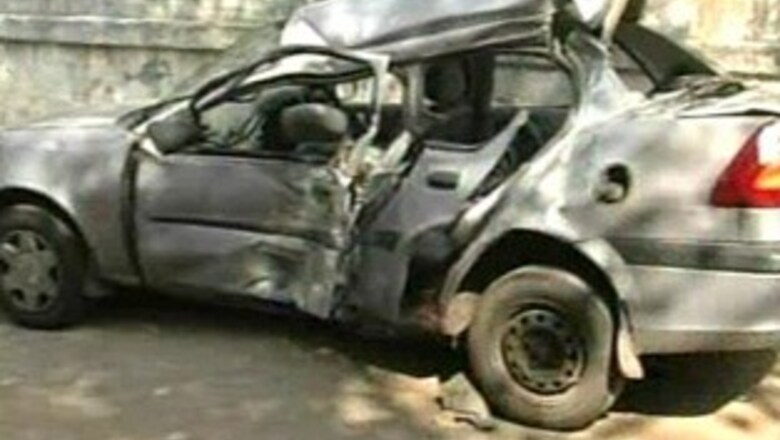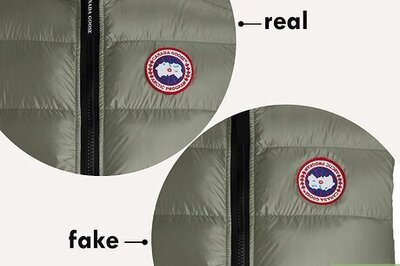
views
These days, less seems to be in. Less flab (even babies are fit!), less clothes (think skimpy outfits), less food at outrageous prices, even less petrol now that we are have battery operated cars.
But less is not always good. After working hard and saving, Pradeep Vazirani bought his dream Sports Utility Vehicle last year. He had his car fully insured.
Unfortunately, his car was in an accident and the back door was completely damaged.
He was calm. After all, his agent told him he was 100 per cent insured. He had opted for a full package policy that covered loss or damage to the vehicle and its accessories along with third party insurance. (Remember, taking a third party policy, which is mandatory, will cover only your legal liability to pay compensation for the third party. Damage to you or your car will not be borne by the company.)
Full package policy covers loss due to any accident -- fire, explosion, self-ignition or lightning, burglary, theft, riot and strike, etc. It is not mandatory, but highly recommended.
Imagine Pradeep's surprise when, in spite of being fully insured, he got 40 per cent less than what was due to him. Did his insurance company just follow the 'less is in' trend or was there a valid reason?
The answers, we found, lie in the exclusions. Most insurance policies come with a set of exclusions that we almost never pay attention to.
i. There is a compulsory deduction made when you claim the loss amount. For example, IFFCO-TOKIO General Insurance Co Ltd deducts Rs 500 when a claim is made. This amount differs from company to company and is meant to protect against petty claims.
ii. Other exclusions under the package policies include wear and tear, breakdowns and consequential loss among others.
iii. But the most important exclusion, and one that affected Pradeep Vazirani's claim, is the damage to tyres, tubes and other nylon, glass and plastic accessories.
Damage to tyres and tubes is not paid for unless the entire vehicle is damaged at the same time of accident. Liability is limited to 50 per cent of the cost of replacement.
"The same is the case with any nylon, plastic parts, battery and air bags. For fibre glass components, the company pays only 30 per cent of the cost," says a spokesperson at Bajaj Allianz General Insurance.
Vazirani had to pay for the plastic door handle, tail lights that include break lights as well as the indicator. He did not know the company does not pay for all the parts made of glass. He paid for that, too.
iv. Also, 15 per cent was deducted on all the steel parts. This was a big cost for him, in spite of having a fully insured car. Plus there was a 10 per cent rate of depreciation for all other parts, including wooden ones, since his car was more than a year old.
Insurance companies attribute this deduction to the rules and regulations laid down by the India Motor Tariff. Bajaj Allianz officials say this tariff was made after a lot of research on the kind of claims the companies were getting. Products such as tyres, batteries and so on are used every day and a depreciation value is attached to them.
Therefore, it is extremely important to read your offer document carefully and be aware of all the hidden clauses like this one.V Ramakrishna, Managing Director, India Insure Risk Management Services Pvt Ltd, points out to a few more things to look out for.
i. Do not take any action on the damaged vehicle -- repairs, moving the vehicle -- before the prior approval of the insurance company/ surveyor.
Sometimes, an insurance company might decide to take a spot survey. It is important then that you keep the car at the accident spot till the survey is over.
ii. Keep all replaced parts for inspection. Do not dispose them till the surveyor gives his/ her approval for the same.
iii. Never enter into a compromise or make an out-of-court settlement with the injured or legal heirs of the deceased without the insurer's consent. These compromises or settlements are not payable in terms of insurance policy.
iv. The documents you need to deposit with your insurers include the original bill of repairs/ replacements, cash memo, payment proof,etc, for finalisation/ disposal of your claim by the insurance
company.
v. You cannot submit xerox copies of bills/ invoices to your insurance company. Do submit original bills.
vi. Once your claim is approved, arrange to deposit the salvaged/ damaged parts with your insurers. Else they may deduct the salvage value from the claim amount.
vii. Do cooperate with the advocate deputed by the insurance company.
Disclaimer: While we have made efforts to ensure the accuracy of our content (consisting of articles and information), neither this website nor the author shall be held responsible for any losses/ incidents suffered by people accessing, using or is supplied with the content.

















Comments
0 comment